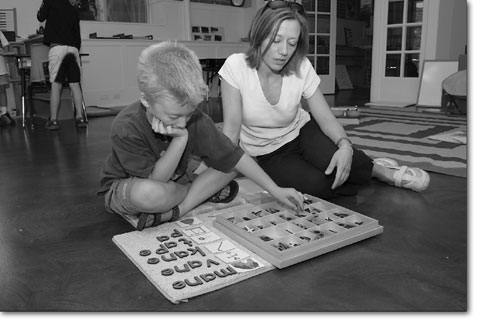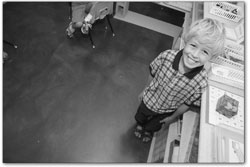|
|
||||
|
Montessori breaks new
ground
by Missy Votel Last week signaled a return to classes for most Durango schoolchildren, but for a small handful, it was a whole new beginning. On Aug. 24, Durango Montessori opened its doors for the first time, offering a Montessori-based curriculum for first- through third-graders, making it the only nonsectarian, private, elementary school in Durango. Located in a newly refurbished space in the Smiley Building, the school has 13 students between the ages of 6 and 9 with room for up to seven more, according to Director Mary Polino. The school, which is run by Polino and another instructor and overseen by a board of directors, also is in the process of obtaining its 501 (c) 3 status, which will make it tax-exempt and enable it to better secure federal funding and grants. For Polino, a former instructor at Durango’s Children’s House Montessori and Children’s House owners, Tom Joyner and Shalley Parmenter, the opening of the school culminates a little less than a year of work. According to Polino, the idea came about as a natural extension of the education being offered at Children’s House, which takes 3- to 6-year-olds. “I don’t know if there’s a right time to start a school, we just did it, and so far so good,” said Polino. The mother of a 6-year-old and a 2-year-old, Polino said she noticed a need for such a school upon moving in 2002 to Durango from Albuquerque, where she taught Montessori elementary for three years. “When I first moved here, I noticed there was no Montessori elementary, and I thought, ‘Maybe that’s OK,’ but the more I thought about it, the more I knew I should do it,” she said. For Polino, whose Montessori career spans about 15 years, the seeds for a school were planted long ago. The pivotal moment came in 1990, when, as a recent graduate with a degree in journalism, she walked into a Montessori school and was “blown away” by what she saw. “I was immediately impressed,” she recalled. “The children were so engaged. They were working and talking and solving problems amongst themselves. I couldn’t believe it – they were learning addition in preschool.” Polino returned to school for her teaching credentials and then pursued the more rigorous Montessori training on top of that. Since then, she has been a strong devotee of the education style, which emphasizes hands-on, individualized learning. “It just becomes part of your life,” she said. “It’s learning by example.” According to Polino, the Montessori Method, which was developed by Italian educator Maria Montessori 100 years ago, differs from a traditional school setting in many ways. For starts, gone are the rows of desks and the teacher standing at the blackboard in front of the class. Rather, the curriculum is individualized, with each student going at his or her own pace with small-group or one-on-one instruction. “Children develop at all different paces,” she said. “So, this way, one child doesn’t have to wait for another to finish his math problem.” At the start of the school following group time, each child is given a list of specific learning tasks to be completed for the day. The teacher crosses each off as it is finished to satisfaction. And while all the ages are grouped together in the same classroom, each child works independently. “Each child is taught to be an independent learner,” Polino said. “They go to their work station, take out the work, do it, and then put it away.”
She said such a method can really pay off in later years. “When they get to high school, they’re highly organized and real self starters. They’re not afraid.” Montessori learning also is more tactile, she said, with the lessons engaging various senses, for example, tracing a letter first with a finger before actually drawing it on paper. “The materials are really hands on, which speaks to children this age,” she said. “They are allowed to explore why things are the way they are.” Durango Montessori also differs in that students aren’t given grades and don’t participate in the standardized Colorado Students Assessment Program tests, or CSAPs, which are mandated under President Bush’s 2002 “No Child Left Behind” act. However, the school does adhere to state curriculum standards and students are assessed to make sure they are progressing, she said. “Each child is expected to do his or her best; they don’t even know what it means not to do their best,” she said. “They just learn to love learning because there’s no one standing over them.” For Joyner, a member of the Durango Montessori board, the latter was one of the motivating factors in sending his 8-year-old daughter, Bryn, to the school. “They’re not beholden to the CSAPs,” he said. “Our children are going to school to learn and not to learn to take tests.” Joyner said he also was drawn to the individualized pace of Durango Montessori. Although happy with Durango public schools and his daughter’s teacher, the large class size didn’t suit him. “In that situation, you have a common denominator thing where everyone needs to be on the same page, whether they’re not there yet or ahead of it,” he said. “Montessori is a fantastic way for children to learn at their own pace. There’s no pressure to achieve – or not to achieve.” Sarah Tescher, whose son, Dylan, 6, also attends Durango Montessori, chose the school for the same reasons. “It’s not that the elementary schools here are bad, they’re great,” said Tescher, a former Miller Middle School teacher who is currently working on her English as a Second Language credential at Fort Lewis College. “But, the Montessori philosophy is such that they have a choice in different learning styles. It’s awesome with learning something hands on, through actually seeing it.” In just one week of school, Tescher said she has noticed a difference in her son. “He’s flourishing,” she said. “Just in a week, his reading has improved so much. It’s such a good environment for fostering confidence.” Polino shares Tescher’s excitement – for the upcoming year, as well as the school’s future. She is hopeful that as the older kids pass up through the ranks, the school will add a fourth and fifth grade, potentially doubling in size. “Right now, we’re taking everything step by step; we have a couple of years still to grow into that,” she said. Meanwhile, she’s working on her next lesson plan, the formation of the earth, which in traditional Montessori fashion, will segue into lessons in history, timelines, botany and geography. “I’m working on building a volcano and how to scatter glitter in water to show how the stars expanded,” she said. “I love it as much as the kids do.”
|
In this week's issue...
- May 15, 2025
- End of the trail
Despite tariff pause, Colorado bike company can’t hang on through supply chain chaos
- May 8, 2025
- Shared pain
Dismal trend highlights need to cut usage in Upper Basin, too
- April 24, 2025
- A tale of two bills
Nuclear gets all the hype, but optimizing infrastructure will have bigger impact



